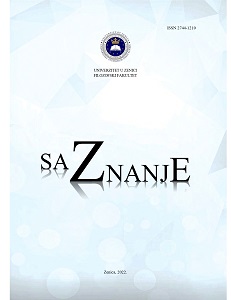ANALIZA SVJEDOČENJA HUSEINA KARABEGA I BOŽIDARA VULOVIĆA, PREŽIVJELIH LOGORAŠA POLITIČKOG LOGORA GOLI OTOK-OD SAZNANJA „OBIČNIH LJUDI“ DO INTERPRETACIJE I NARATIVIZACIJE KULTURE SJEĆANJA
ANALYSIS OF TESTIMONY OF HUSEIN KARABEG AND BOZIDAR VULOVIC, THE SURVIVORS OF THE POLITICAL PRISON CAMP GOLI OTOK-FROM STORIES OD „ORDINARY PEOPLE“ TO INTERPRETATION AND NARRATIVIZATION OF MEMORY CULTURE
Author(s): Emina Đelilović-KevrićSubject(s): Local History / Microhistory, Military history, Oral history, Post-War period (1950 - 1989), History of Communism
Published by: Filozofski fakultet, Univerzitet u Zenici
Keywords: camp experiences; cultural memories; rewriting history; testimonies; political prison camp Goli otok;
Summary/Abstract: In this paper the testimonies of Husein Karabeg and Bozidar Vulovic are being analysed based on the conducted interviews with survivors of the political prison camp Goli otok. The purpose of this paper is to determine what role do testimonies of survivors have in the context of individual, collective memory and what is their role in the development of memory culture as the mechanism of transferring stories from the victim itself. This analysis asserts the problem of (re)presentation of testimony, its diversity compared to the testimonies and the subjective/ objective relation to the official findings of the existence of political camp Goli otok. The expression of trauma is problematized as well as the possibility of facing with it. Considering this, the problem of memorizing the past through the prism of individual testimonies is being asserted, i.e the essential ethical and empirical findings of „ordinary people“ that are removed from history canons. By analogy, another question arises: can and in what way the direct testimonies function as culture of memory? I.e. in what way do they show and build the culture of memory considering the subjective perspective of micro stories? The testimonies are analysed through some of the theoretical reflections of Michael Foucault, and theorists from South Slavic areas who dealt with this issues such as Renata Jambrešić-Kirin and Ivan Kostić.
Journal: saZnanje
- Issue Year: 3/2022
- Issue No: 3
- Page Range: 192-205
- Page Count: 14
- Language: Bosnian

